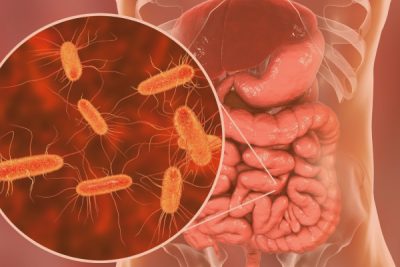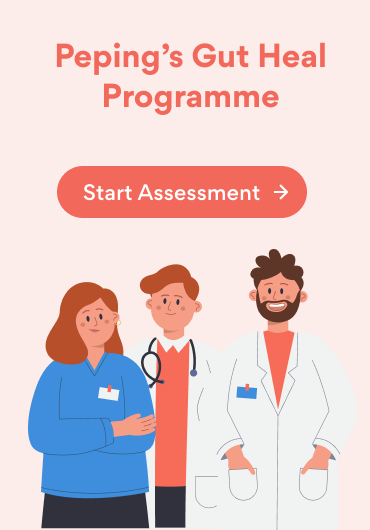IBS and IBD are both problems that arise in the GI system, however, both are quite different from each other. They are two distinct yet commonly misunderstood conditions affecting the digestive system. At first, the symptoms of both might seem similar, however, it is extremely crucial to diagnose both as one is a functional disorder while the other is an organic disease. It is also important to differentiate between them for proper medical intervention and improved quality of life. There is a lot of confusion between Irritable Bowel Syndrome (IBS) and Inflammatory Bowel Disease (IBD).
This article aims to provide the distinct nature of these gastrointestinal conditions. By understanding the differences between IBS and IBD, individuals can seek appropriate diagnosis and treatment to effectively manage their symptoms. We will also explore the unique characteristics, symptoms, causes, and treatments of IBS and IBD.
Let’s start by understanding the symptoms of IBS and IBD and how can they be different
Symptoms of IBS and IBD
Proper diagnosis plays a vital role in distinguishing between IBS and IBD. While both conditions share certain symptoms, a thorough evaluation is necessary to determine the appropriate treatment approach. Let’s explore the distinct symptoms associated with each condition and understand why an accurate diagnosis is crucial.
Symptoms of IBS
IBS is characterized by recurring gastrointestinal symptoms, which can significantly impact an individual’s daily life. Common symptoms of IBS include:
- Change in the frequency of bowel movement – Diarrhea, Constipation, and sometimes both
- Abdominal Pain – This is often experienced as cramping, which may be relieved after a bowel movement.
- Bloating and swelling of the stomach – Many IBS sufferers experience abdominal bloating and a feeling of fullness.
- Flatulence – Increased flatulence and the passage of gas are commonly reported symptoms.
Symptoms of IBD
Inflammatory Bowel Disease (IBD) refers to chronic inflammation of the digestive tract. It primarily includes two conditions: Crohn’s disease and ulcerative colitis. The symptoms of IBD can vary depending on the specific type and location of inflammation. Common symptoms of IBD include
- Abdominal pain and cramping: Persistent pain and cramping in the abdominal region are key symptoms of IBD.
- Diarrhea: Frequent and loose stools are common, often accompanied by blood or mucus.
- Weight loss: Unintentional weight loss can occur due to reduced appetite and nutrient malabsorption.
- Fatigue: Chronic inflammation and the body’s immune response can lead to fatigue and low energy levels.
- Rectal bleeding: Blood in the stool is a significant symptom that may indicate inflammation in the rectum or colon.
Symptoms Common Between IBS and IBD
Few symptoms overlap between IBS and IBD and it is important to know those. Shared symptoms may include:
- Abdominal pain or discomfort: Both IBS and IBD can cause abdominal pain, although the nature and severity may vary.
- Altered bowel habits: Changes in bowel movements, such as diarrhea or constipation, can occur in both conditions.
- Bloating and gas: Abdominal bloating and excessive gas can be experienced in both IBS and IBD. Flatulence and burping exists in both IBD and IBS
While these shared symptoms can be similar, their underlying causes and management approaches differ. Understanding the unique symptoms of each condition is crucial for accurate diagnosis and effective treatment.
Symptoms that differentiate IBD from IBS
Most important thing is to understand the symptoms that are peculiar to IBD and help in distinguishing it from IBS
- Unintentional Weight loss – If there is a weight loss of more than 5Kgs in 6 months, it could be a sign of IBD and it is important to get diagnosed
- Blood in Stools – Rectum bleeding happens in IBD and not IBS. Blood in stools indicate IBD
- Black Colored Stools – Occult blood in stools leads to a black color which can be found out through a stool test.
- Inflammation in skin, eyes or joint – Inflammation in other body parts also might indicate IBD

What is the Technical Difference between IBS and IBD?
Let us understand what IBS and IBD are from a pathophysiological and diagnostic criteria.
1. What is IBS?
Irritable Bowel Syndrome or IBS is the new term on the block. Let’s understand in a very crisp way about IBS. Gastrointestinal Issues can be divided into two categories – Organic GI Issues and Functional GI Issues. While organic issues are characterized by biochemical signals that have measurable physiological changes, functional GI issues have been termed as “not explainable by structural abnormalities” These issues consist of a group of lifestyle disorders that are characterized by symptoms like abdominal pain, bloating, and the traditional pathology is not able to deliver measurable results
In simple terms, functional GI issues are syndromes or lifestyle disorders which can be managed in life. Irritable Bowel Syndrome is one such functional disorder that develops in the intestines and can cause abdominal pain, bloating, constipation, gastritis, diarrhea, and a few other disturbances. It is characterized by chronic abdominal pain or discomfort, along with changes in bowel habits
Some key points to understand about IBS include:
- It is a diagnosis of exclusion, meaning that other conditions with similar symptoms must be ruled out before confirming IBS.
- The exact cause of IBS is not fully understood, but factors such as abnormal gastrointestinal motility, hypersensitivity, and disturbances in the gut-brain axis are believed to play a role.
- Diagnostic criteria for IBS include the presence of recurrent abdominal pain or discomfort for at least six months, along with specific patterns of bowel habit changes.
2. What is IBD?
Inflammatory Bowel Disease (IBD) refers to a group of chronic inflammatory disorders of the digestive tract, primarily including Crohn’s disease and ulcerative colitis. Unlike IBS, IBD is characterized by visible inflammation and structural changes in the intestinal lining.
Important points to know about IBD are:
- It is an autoimmune or immune-mediated condition in which the immune system mistakenly attacks the digestive tract, leading to inflammation.
- Crohn’s disease can affect any part of the gastrointestinal tract and can involve the entire thickness of the intestinal wall, while ulcerative colitis primarily affects the colon and rectum.
- Diagnostic methods for IBD include endoscopic procedures, imaging tests, and laboratory investigations to assess inflammatory markers.
3. Can IBS Lead to IBD?
It is important to note that while IBS and IBD share some similarities in symptoms, they are distinct conditions with different underlying causes. IBS itself does not progress to IBD. However, it is possible for individuals to have both conditions concurrently, leading to more complex symptomatology and management challenges.
Understanding the technical differences between IBS and IBD is essential for accurate diagnosis, appropriate treatment, and effective management of these gastrointestinal conditions. Next, we will explore the causes of IBS and IBD to gain a comprehensive understanding of their etiology.
How are IBD and IBS Caused?
The causes of Irritable Bowel Syndrome (IBS) and Inflammatory Bowel Disease (IBD) are complex and multifactorial. Various factors contribute to the development and progression of these conditions.
1. Causes of IBS
There is no exact cause of IBS, however different factors are known to have strong correlations with IBS symptoms
- Food intolerances and insensitivities – Consumption of trigger food is known to have a correlation with IBS. Many people observe their IBS flaring up when they intake certain foods.
- Muscle Spasm – Intestinal muscle spasms can lead to IBS of all types. When the contractions are stronger, it can cause pain, bloating and gas and when the contractions are weaker, it can lead to constipation
- Food poisoning or infections – Bacterial or viral infections can lead to gastroenteritis which can weaken the gut lining and cause IBS
- Stress – The gut-Brain axis plays a major role. A weak gut-brain connection can result in bloating, diarrhoea and pain in response to digestive processes. Stress is known to create bowel urgency and worsens IBS symptoms
- Gut Imbalance – Many times the bad bacteria supersede the good bacteria in the gut which leads to a lot of imbalance that can trigger IBS symptoms.
2. Causes of IBD
Inflammatory Bowel Disease (IBD) is caused due to a complex interaction between genes, gut microflora, environmental factors and immunity
- Genetic Predisposition: Certain genetic variations can increase the susceptibility to IBD. Family history of IBD is considered a significant risk factor.
- Immune Dysregulation: Abnormal immune responses in individuals with IBD lead to chronic inflammation in the digestive tract. The immune system mistakenly targets harmless substances, triggering an ongoing inflammatory process.
- Environmental Triggers: Environmental factors, such as diet, smoking, medications, and microbial exposures, may influence the development and exacerbation of IBD.
- Dysbiosis and Microbial Factors: An unhealthy gut microflora is one of the causes of IBD. Disruptions in the delicate balance between good and bad bacteria can contribute to the inflammatory process.
Understanding the underlying causes of IBS and IBD provides valuable insights into the management and treatment strategies for these conditions. In the next section, we will explore the various treatment approaches available for individuals with IBS and IBD.
Treatment for IBS and IBD

Treatment for IBS
Holistic care consisting of diagnosis, nutrition, exercise, and stress management is required to manage IBS effectively.
Does IBS cure exist? Can IBS bloating be resolved? What about IBS D or IBS C treatment? These are the most important questions in the mind of the patient. Irritable Bowel Syndrome treatment is more management than cure.
Let’s look at how IBS can be managed
1.Deep Diagnosis –
The first step is to consult a doctor and have a deep diagnosis of the case. A lot many times symptoms of Organic issues can look similar to the IBS issues and a patient might overlook them. However, it is important to consult a doctor to check for any red flags. Diagnostic tests may include blood tests, stool tests, endoscopic procedures, and imaging tests
2.Nutrition –
Nutrition is one of the most important aspects of managing IBS. Identification of trigger foods, and consumption of foods which contain bacteria. The addition of healthy foods, elimination of trigger foods and eating a wholesome diet are of extreme importance. Following a low-FODMAP diet, which limits fermentable carbohydrates that can trigger symptoms, may provide relief for many individuals[^6^]
3.Exercise –
Walking, Yoga, Swimming, and Running are known to manage IBS symptoms and relieve issues like bloating, gastritis etc. Regular physical activity can help improve digestion and reduce stress, which are both beneficial for managing IBS symptoms.
4.Stress Management –
Mindfulness is of extreme importance. The first step is acceptance followed by an attitude change towards IBS. IBS cannot be cured with a single pill and is an issue that needs to be managed. A relaxed mind can help in curbing certain symptoms. Implementing stress management techniques such as mindfulness, meditation, deep breathing exercises, or seeking support through therapy or support groups can be helpful in managing stress and improving symptom control.
So when it comes to IBS bloating treatment or IBS cramps treatment, the answer is always managing the symptom.
Treatment for IBD
Proper Diagnosis, Diet control, stress management and medication are extremely important for treating IBD
1.Diagnosis
Accurate diagnosis is crucial for effective management of IBD. A gastroenterologist will assess the symptoms, conduct diagnostic tests, and may perform endoscopic procedures, imaging tests, and blood tests to confirm the diagnosis[^4^]. It is important to consult with a healthcare professional experienced in IBD management to ensure proper evaluation and diagnosis.
2.Medication and Surgery
Anti-inflammatory medications are given to reduce the inflammation. Medication treatment depends on case to case basis. In mild cases, anti-inflammatory drugs are given. In some cases immonomodulators are used while in some total colectomy is required. Surgical interventions may include removal of damaged sections of the intestines, formation of an ileostomy or colostomy, or other procedures to manage complications or improve quality of life[^12^]. Surgical options should be discussed with a gastroenterologist or colorectal surgeon specialized in IBD. It is extremely important o see a doctor before beginning the treatment for IBD.
Conclusion
In conclusion, differentiating between Irritable Bowel Syndrome (IBS) and Inflammatory Bowel Disease (IBD) is crucial for accurate diagnosis and appropriate treatment. While both conditions share some similar symptoms, they have distinct characteristics and require different approaches for management.
Remember, IBS is a functional disorder of the digestive system characterized by recurring abdominal pain, bloating, and changes in bowel habits. It does not cause inflammation or damage to the intestines. On the other hand, IBD refers to chronic inflammation of the digestive tract and includes conditions like Crohn’s disease and ulcerative colitis.
For individuals diagnosed with IBD, treatment involves a multidisciplinary approach. It may include medications to control inflammation, manage symptoms, and prevent flare-ups. In severe cases, surgical interventions may be necessary to remove affected areas of the digestive tract or alleviate complications.
Accurate diagnosis, ongoing medical management, and regular monitoring are essential for individuals with IBS or IBD to achieve optimal well-being and improve their quality of life.
Remember, this article serves as a guide, and it is important to consult with a healthcare professional for personalized advice and treatment options based on individual circumstances.
By understanding the differences between IBS and IBD, individuals can take control of their digestive health, seek appropriate medical care, and make informed choices to effectively manage their condition.













